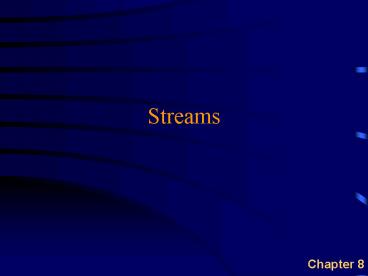Streams PowerPoint PPT Presentation
1 / 17
Title: Streams
1
Streams
Chapter 8
2
C Input/Output Streams
- The basic data type for I/O in C is the stream
- We've used the standard input/output streams
- istream cin built-in input stream variable
- ostream cout built-in output stream variable
- The I/O functions of C can be also be used in a
C program - From library ltstdiogt scanf (input), printf
(output) - In CS-201, use streams for input and output of
data
3
iostream Library Header Files
- iostream library
- ltiostreamgt cin, cout, cerr, and clog objects
- ltiomanipgt parameterized stream manipulators
- ltfstreamgt information important to
user-controlled file processing operations
4
Output the Insertion Operator
- The standard I/O streams are defined in the
iostream library. Accessing the objects and
functions from this library requires the
following pre-processor directive include
ltiostreamgt - Then output is achieved with a statement like
cout ltlt " X " ltlt X - The ltlt (insertion operator) is
- Binary, left associative
- Requires an output stream (like cout) for its
left argument - Supports many data type for its right argument
- Returns an output stream object
- Thus Insertions to an output stream can be
"chained" together
5
Tracing Output Execution
- Assume X 25, A 10, B -3
- cout ltlt " X " ltlt X //"X " is output
- cout ltlt X //"25" is output
- cout //no effect
- cout ltlt (A B) ltlt " " ltlt (A B) ltlt endl
- cout ltlt 7 ltlt " " ltlt (A B) ltlt endl
- cout ltlt 7 ltlt " " ltlt 13 ltlt endl
- cout ltlt " " ltlt 13 ltlt endl
- cout ltlt 13 ltlt endl
- cout ltlt endl
- cout
6
Input the Extraction Operator
- As with the standard output stream, cout, to use
the standard input stream (cin) a program must
use the pre-compiler directive include
ltiostreamgt - Then input is achieved with a statement like
cin gtgt X where X is the name of the variable
assigned the value read from the keyboard
7
Input the Extraction Operator
- gtgt (stream-extraction) used to perform stream
input - Normally ignores whitespaces (spaces, tabs,
newlines) - Returns zero (false) when EOF is encountered
- otherwise returns a reference to the object from
which it was invoked (i.e. cin) - This enables cascaded input. cin gtgt x gtgt y
8
iostream Stream Objects
- istream input streams
- cin gtgt someVariable
- cin knows what type of data is to be assigned to
someVariable (based on the type of someVariable) - ostream output streams
- cout ltlt someVariable
- cout knows the type of data to output
- cerr ltlt someString
- Unbuffered. Prints someString immediately
- clog ltlt someString
- Buffered. Prints someString only when output
buffer is full or flushed
9
Priority of Stream Operators
- gtgt and ltlt have relatively high precedence
- conditional assignment expressions must be in
parenthesescout ltlt "1 2 " ltlt (x 5) - NOTcout ltlt "1 2 " ltlt x 5
10
Character output with put
- put member function
- Outputs one character to specified stream
- cout.put('A')
- May be called with an ASCII-valued expression
- cout.put(65)
- outputs A
11
get Member Functions
- cin.get() inputs a character from stream (even
white spaces) and returns it - cin.get(c) inputs a character from stream and
stores it in c - Reference parameter
12
Type-Safe I/O
- ltlt and gtgt operators
- Designed to accept data of different types
- When unexpected data encountered, error flags set
- Program stays in control
13
Extraction Operator and Whitespace
- In programming, common characters that do not
produce a visible image on a page or in a file
are referred to as whitespace - The most common whitespace characters are
- newline (\n)
- tab (\t)
- space
- By default, the extraction operator in C will
ignore leading whitespace characters - That is, the extraction operator will remove
leading whitespace characters from the input
stream and discard them - A mechanism exists for overiding this behavior
14
Details of an Extraction
Assume the input stream cin contains 12 17.3
-19
- Suppose that X is declared as an int, and the
following statement is executed cin gtgt X - The type of X determines how the extraction is
performed - First, any leading whitespace characters are
discarded - Since an integer value is being read, the
extraction will stop when a character that
couldn't be part of an integer is found - The digits '1' and '2' are extracted, and the
next character is whitespace, so the extraction
stops and X gets the value 12 - The whitespace after the '2' is left in the input
stream
15
ignore() Member Function
- There is also a way to remove and discard
characters from an input stream cin.ignore(5,
'') - read and discard characters from the input stream
until - 5 characters have been discardedor
- A '' character has been read and discarded
16
Stream Manipulators Member Functions
- stream manipulator/member function capabilities
- setting field widths
- setting precisions
- setting the format of bool output
- setting the fill character in fields
- flushing streams
- inserting a newline in the output stream and
flushing - inserting a null character in the output stream
- skipping whitespace in the input stream
17
Some examples of cout member functions
- precision member function
- sets number of digits to the right of decimal
point - cout.precision(2)
- cout.precision() returns current precision
setting, unchanged - setf member function
- Used to set one of many formats
- Often used in place of manipulators
- cout.setf(ios_baseboolalpha)

